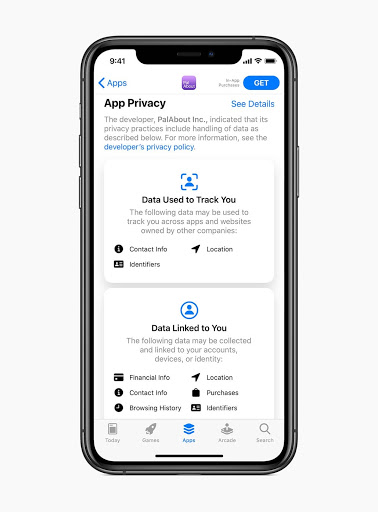Table of Contents
Apple’s iOS 14 Release
Apple has announced upcoming changes to be introduced in the new iOS 14 that will impact how Facebook receives and processes conversion events and data using tracking tools like Pixel & SDK. Once these changes take place, Facebook and any other app, will need to request permission through Apple’s AppTrackingTransparency framework in order to track conversion events and any behaviors that provide data occurring on iOS 14 devices. Below, we’re providing you with full guidance on what these changes are and how it will affect your Facebook ads and any kind of third-party tool that you use for tracking and analytics as well as how to prepare for the changes that are expected to be introduced with the upcoming iOS update in early 2021.
What is Apple's AppTrackingTransparency Framework?

AppTrackingTransparency is the new framework that will be launched starting early next year with all iOS 14 devices. This framework aims to provide Apple iOS 14 users with more privacy and data protection; third-party apps will need to ask users for their permission to track their actions across apps and websites. Users will also get to learn more about data types and how it might be collected and used by apps and third-parties and whether the information is used to track them or is linked to their devices.
Learn more about Apple’s AppTrackingTransparency framework
Facebook response to Apple’s iOS 14 release

Facebook has publicly criticized Apple for the upcoming iOS privacy changes in a full-page newspaper ad. “We’re standing up to Apple for small businesses everywhere,” Facebook says that Apple’s iOS 14 privacy changes will make it more difficult for companies like Facebook to target users with ads. Facebook says Apple’s changes will be “devastating to small businesses” that rely on its ads to generate sales and achieve business goals.
Facebook updates in response to Apple’s release
- Impact on conversions
Once the privacy update rolls out, advertisers will see fewer conversions on ads manager dashboards. This will be due to the conversion tracking blocking, which will also result in less efficient retargeting in the long run due to the lack of iOS users’ data.
- Maximum number of conversions per domain
The number of conversions that can be set up to be tracked on a domain will now be limited by Facebook to a maximum of 8 conversions per domain. Facebook will decide which events are relevant to each business.
- Custom conversion events
Campaigns with custom conversions as the main objective will be stopped. Advertisers will only be able to optimize for any of the 8 standard events Facebook will choose for every business.
- Facebook attribution window
Facebook attribution window has now been changed to the following attribution settings:
- 1-day click
- 7-day click (default)
- 1-day click and 1-day view
- 7-day click and 1-day view
- 1-day click and 1-day view
This means that 28-day click-through, 28-day view-through, and 7-day view-through attribution windows will no longer be supported.
Note: Specifying an attribution window will now be chosen in the ad-set level, which means that different ad sets can possibly have different attribution windows based on the advertiser’s preference.
The New Facebook Limitations
- Ad creation limitations
According to the new iOS 14 update, you can advertise to devices on iOS 14, but you will need to create a separate app installs campaign due to reporting limitations from Apple’s SKAdNetwork API. Each iOS 14 app installs campaign is limited to only 9 campaigns per app, and each campaign is limited to 5 ad sets of the same optimization type. Once your campaign is published, you can’t turn on or turn off the iOS 14 campaign toggle. You’ll have to turn off or delete your campaign. - Conversions events
The Facebook Pixel may only optimize for a maximum number of 8 conversion events for each domain. Facebook will arrange the events that are most likely to be relevant to your business,
and all the other events will be inactive for optimization and reporting. - Targeting Limitations
As more people choose not to be tracked through iOS 14 devices, the size of your app connection, app activity custom audiences and website custom audiences will decrease. As well, Audience Network placement might be removed. - Dynamic ads limitations
As more devices will be updated to iOS 14, the size of the retargeting audience will decrease.
If you plan to deliver dynamic ads for your business’s website you need to set up the Facebook Catalog to use only one pixel. Your pixel will only report and optimize for a maximum number of 8 conversion events for each domain that will be most relevant to your business based on your activity. Unlike, if you plan to deliver dynamic ads for your business’s app, you have to create a new campaign that optimizes for link clicks and directs all iOS 14 devices to an app destination as some of iOS 14 devices may default to a mobile web browser destination instead of an app or app store.
Reporting Limitations
For iOS 14 app install campaigns, reporting will need to rely on data from Apple’s SKAdNetwork API for mobile app installs and other app conversion events.
The following limitations are expected across Ads Manager, Ads Reporting, and the Ads Insights API.
- Delayed reporting: Real-time reporting will not be supported, and data may be delayed up to 3 days.
- No support for breakdowns: For both app and web conversions, delivery and action breakdowns such as gender, age, region, and placement data will not be supported.
- Account attribution window setting: The attribution window for all new or active ad campaigns will be set at the ad set level, rather than at the account level once. The default window for all new or active ad campaigns (other than iOS 14 app install campaigns) will be set at a 7-day click attribution window.
- Delayed reporting: Real-time reporting will not be supported, and data may be delayed up to 3 days.
How to prepare and adapt
Here is how you can prepare in order to continue to deliver and measure the performance of your campaigns.
For advertisers planning to deliver ads using conversions events that happen on their business’s Apps:
Facebook’s SDK for iOS 14 version 8.1, currently supports Apple’s SKAdNetwork API and enables measurement for app install ads. Advertisers should update to Facebook’s SDK for iOS 14 version 8.1 to help personalize ads delivered to devices on iOS 14 and continue to receive app conversion events reporting from iOS 14 devices. This can be done from Events Manager. If you don’t have the SDK installed, you may want to install it.
For advertisers planning to deliver ads using conversions events that happen on their business’s website:
Advertisers may need to verify their website’s domain to avoid any future disruption of their website’s campaigns. The verification must be completed for the domain with all its subdomains and levels.
For example
“www.ripplemarkeg.com” , “www.ripplemarkeg.com”, “www.blog.ripplemarkeg.com” & “blog.ripplemarkeg.com”
This can help ensure that your domain verification will encompass all variations.
Domain verification should be prioritized for domains with pixels used by multiple businesses or personal ad accounts. This will enable advertisers to configure pixel conversion events when Aggregated Event Measurement becomes available.
For advertisers planning to deliver ads for both web and app conversion events, all actions listed above must be taken.
Click here for further information via Facebook for Business.








